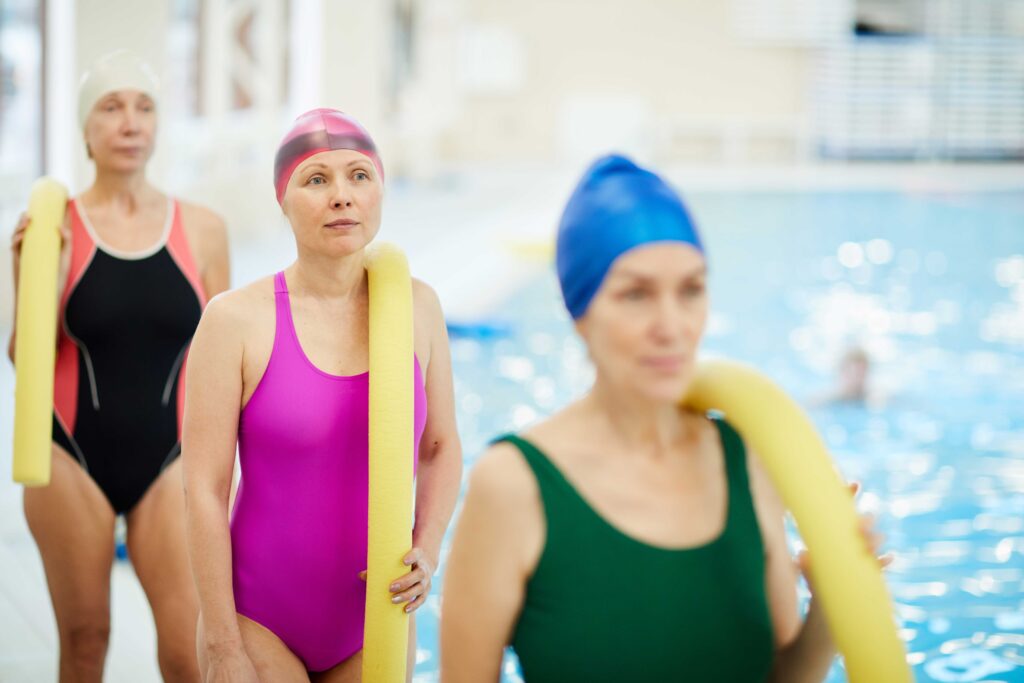In the field of sports, swimming has been hailed as a full-body, low-impact activity that really greatly benefits anyone who wants to get into an active lifestyle but may be limited by certain factors. You may have even heard of individuals using swimming as a therapeutic entry point to getting into an active lifestyle again. What is most interesting about swimming is that it not only provides a development in your overall physical well-being, it actually touches on other aspects of your recovery particularly emotional and psychological.
Before You Get In The Water
First of all, you will need to talk to your doctor as to when you are ready to get into the pool. Especially for those who have only recently gotten their surgery, it would be wise to hold off from water-exposure or intense physical activity during the early stages of recovery from surgery. So when is it a good time to swim? In most cases of breast surgery, you can already start swimming 3-4 weeks after your operation. However, the above range is only an estimate but not a directive. Your doctor is still the best person to advise on when you are ready for water entry.
Most likely your doctor will check your physical condition and more importantly, how well your scars are healing. The last thing we will want is any infection that is brought about premature exposure to water on the site of healing.
Physical Benefits of Swimming

Through the reliance of buoyancy and adjustable resistance in water, swimming is a perfect low-impact exercise with varying degrees of intensity. Because our focus on recovery is in your upper body area, you will want to draw focus on movements and routines that target upper body strengthening. Regulated exercising in this region will help improve blood flow and provide the necessary stretching needed for your recovery process. Stretching and exercise is not just great for toning your muscles in general, but it really does help for scar tissue management as well.
In the water you can also improve your range of motion gradually. There is a sense of confidence in movement one can feel when there is lesser resistance from gravity. That is why apart from patients recovering from surgery, you will have all kinds of people using water-therapy as an entry point for physical improvement.
Despite the reputation of swimming as low-impact, it is interesting to know that swimming actually burns a lot of calories! Compared to land activities, swimming involves complete body movement and you no longer realize that you are working muscles you normally don’t actively use on dry land. Especially since the water regulates your body heat, you don’t feel burnt out until you actually leave the water. This is also why it is vital to keep track of how long you have been in the water.
Swimming Tips for The Recovering Individual
It’s important to remember the aspect of low-intensity in swimming as an activity. You will want to time your activity so that you are not exceeding your physical capacity. I know swimming can be a fun activity but if your doctor has advised on certain precautions such as the duration of your swimming as well as heart rate management then it is best to heed these instructions.
Listening to your body is a very important part of the process. Pain is not necessarily “gain” so if you do feel some aspect of discomfort or actual pain, you need to let your doctor or rehabilitation therapist know about these experiences.
There are physical therapists who are knowledgeable in guiding water activities while in recovery. Having a registered physical therapist will set the foundations for swimming as a rehabilitation activity.
You might also be wondering about what to wear when swimming, especially if you find your old swimwear no longer fitting you properly after surgery. We have come up with a swimwear guide post-mastectomy. It’s an exciting opportunity to discover new styles you can take with you to the water.
Good for The Mind and The Heart
Most aspects of swimming listed above cover physical benefits. Did you know that swimming also helps in emotional and mental aspects?
Initially, it is understandable that some women may be conscious about the physical appearance of their body post-surgery. Whether it is the change in their bust shape and form, or weight gained after the surgery and lack of physical activity, all feelings of insecurity are valid and not uncommon at all. It has been known that regular swimming eventually builds an acceptance of one’s body. There are several explanations for this but the general idea is that you generate positive feelings while swimming so you think less of how you look, and more of how you feel during the activity.
Swimming is your gateway to building that body confidence not just through losing weight but through the enjoyment of your own body in an activity that brings you happiness.
